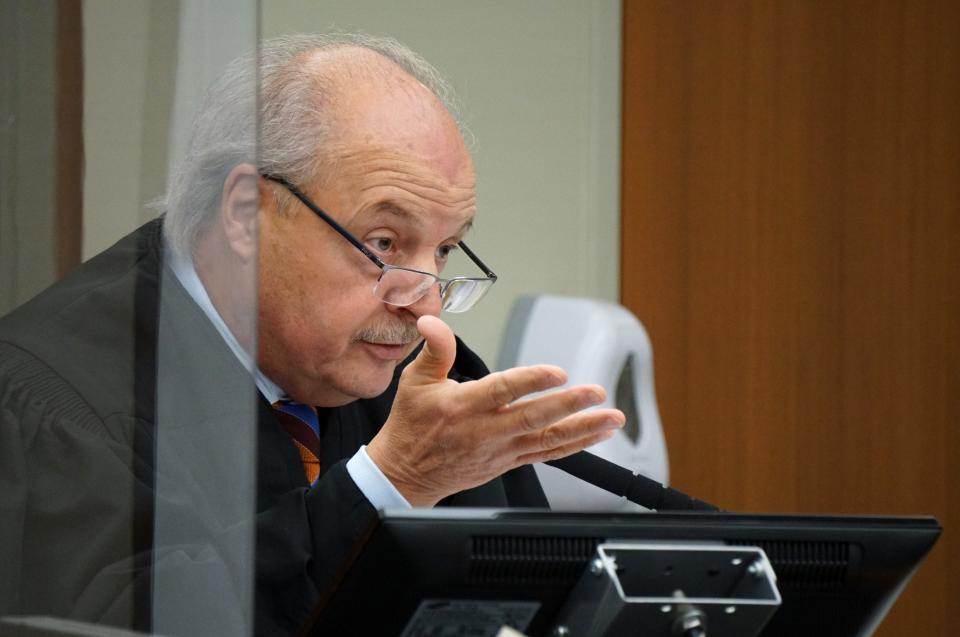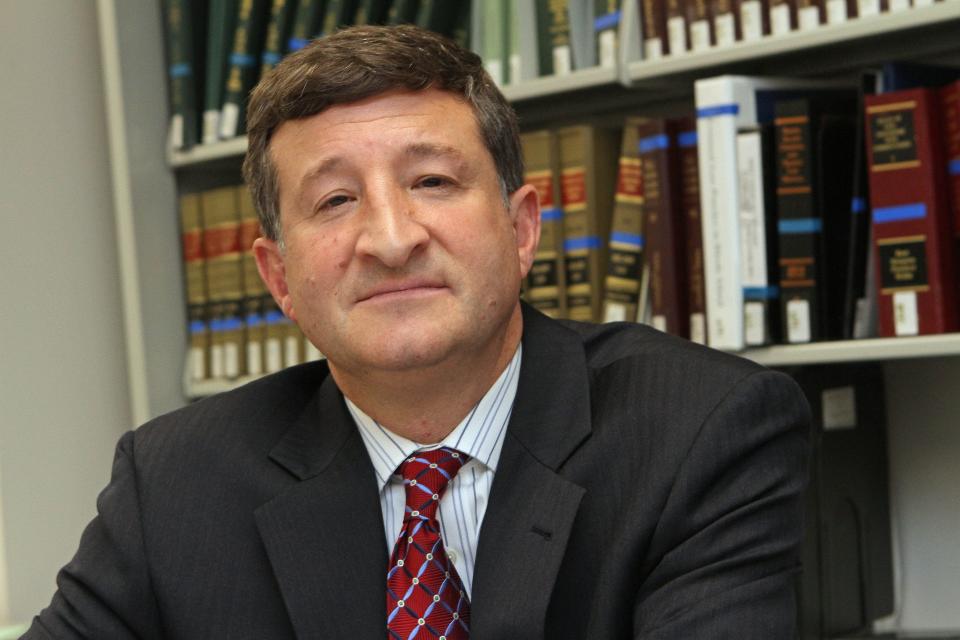Court-appointed lawyers are a constitutional right. But in RI, fewer are taking the job.
PROVIDENCE — Staff shortages at the Rhode Island Public Defender’s office are leaving courtrooms in Newport and Washington County District Court without coverage this summer, forcing judges to appoint lawyers to represent people who can’t afford to hire their own attorney.
The staffing crisis comes as some of the state’s most skilled lawyers are dropping off the lists of the court-appointed lawyers the courts rely on, citing low rates paid by the state for taking on these cases and the time involved in representing indigent clients.
Collin Geiselman, who was sworn in in June as the state’s top public defender, said that due to resignations, retirements and people out on family leave, the Public Defender’s office was left unable to physically staff all the courtrooms in the state.
“This became an issue of bodies and staffing. … We didn’t have enough bodies,” he said.
The office is currently down nine lawyers out of 54, with five positions in the process of being filled. They decided that it would be least disruptive to the criminal justice system to pull lawyers from District Court in Newport and Washington counties, he said.
“We just got to a point where we couldn’t fill every position where a lawyer is needed,” he said.
The decision, which took effect in June, was made in consultation with the state Supreme Court with the understanding that the office would be back up to full force in late August, he said.
“The Supreme Court was fantastic," Geiselman said. "They were very accommodating.”
To accommodate the public defender shortages, the judiciary agreed to pay a court-appointed lawyer $500 a day to provide attorney-of-the-day coverage in Newport and Washington County District Courts out of the courts' $5 million indigent defense fund, according to Lexi Kriss, courts spokeswoman.
How court-appointed lawyer lists work in Rhode Island
Judges draw lawyers from the lists of attorneys certified by the court when an individual is unable to afford their own attorney and the state Public Defender’s office has a conflict of interest, such as someone from the office is representing the co-defendant. Each respective court, including the Supreme, Superior, Family, District, and Workers' Compensation courts, are tasked with establishing and supervising a rotating list of qualified attorneys available for court appointments in their respective jurisdictions.
Lawyers must meet certain requirements to earn certification. For example, to represent a person accused of murder, a lawyer must have served as associate counsel under the supervision of a mentor on two murder trials through to verdict.
“I would say my overall experience with court-appointed lawyers has been very positive,” Superior Court Judge Daniel A. Procaccini said recently. “We are very fortunate to have some very competent, experienced lawyers willing to go on the list. … They are essential to protect everyone’s constitutional right to a lawyer.”

But, he said, if experienced lawyers drop off the court-appointed lists, “it will certainly create some hardships for the criminal justice system.”
90% of the caseload for just 20% of their income
Anthony F. Amalfetano, a former assistant public defender, has been doing court-appointed work since the 1980s and has been gradually stepping off lists, including those in Superior Court just over a year ago.
“I enjoy doing the work,” he said, of representing clients of “very little means.” “My thoughts were always to stay busy.”
“The rates were always low to begin with. It’s been obviously an issue through the years and years I did it,” he said.
Juggling the work in various courts becomes difficult to balance with the bread-winning private practice, lawyers say.
One, who declined to be identified, estimated that the fees paid to court-appointed lawyers are roughly a third of what they earn in private practice. Court-appointed work had grown to encompass 90% of their caseload while amounting to only 20% of their income.
“Sometimes it does take a lot of time. It’s hard to sustain a practice for the rates they pay,” Amalfetano said. Court records indicate that Amalfetano earned $271,040 in court-appointed fees for the fiscal years 2018 through 2022.
Glenn Sparr, an active court-appointed lawyer in Superior Court, is in the process of taking himself off the court-appointed list for defendants seeking to overturn their convictions.
Sparr said he made the decision due to the “time and energy” the cases take while managing his private practice.
Sparr was also one of the top court-appointed earners over the previous five years, netting $372,427.
Ronald Desnoyers earned the most court-appointment fees in the state during the same time period, with $606,121. Desnoyers did not respond to The Journal’s phone calls and emails.
More from RI courts: 'Dark cloud' over District Court: Ex admin alleges coverups, dysfunction and retaliation
Lawyers question hourly rates, rules for court-appointed cases
Pamela E. Chin, a former state and federal prosecutor who now practices with Lynch & Pine, is among the lawyers who expects to drop off all the court-appointed lists in the coming year. Though she plans to stop doing court-appointed representation, she said she has always seen it as a responsibility, as a member of the bar, to provide legal services for indigent clients.
“I have been accepting court-appointed cases whenever I have been in private practice. I expect to receive lower fees, because that’s the nature of the work. There is also a time component. It seems that more and more hours are needed to handle cases these days, especially in Superior Court,” Chin said in an email.
Chin questioned hourly rates to represent indigent people charged with serious “Class 1” felonies, such as rape, kidnapping or robbery, compared with those charged with equally potentially life-altering “Class 2” felonies.
Court-appointed lawyers are paid $90 an hour with a $10,000 threshold for Class 1 felonies, and $60 an hour with a $5,000 cap for Class 2 crimes such as breaking and entering, larceny, possession of a stolen motor vehicle and some drug offenses. (The rate to represent someone accused of murder is $100 with a $30,000 cap.)
“I have been struggling with fee schedules which are currently in place. … While I understand the different thresholds, I cannot understand why there are different rates. Does my legal experience have less value when I’m handling a Class 2 Felony?” Chin asked.
By comparison, the hourly rate to represent an individual in a capital case in federal court in which the death penalty could be in play is $210. The hourly rate for non-capital cases is $164 with a $12,800 cap.

Chin questioned, too, policies that require court-appointed counsel to spend time, and therefore money, filing a motion to get approval to hire an investigator to assist in the case.
The rules require a court-appointed lawyer to secure a court order to allow the expense of hiring an investigator, which cannot exceed $500 initially. If the investigator fees are higher, the lawyer must then seek another court order approving any overage.
Filing a motion in court to get the court’s go-ahead to hire an investigator takes time that could be spent working on the case instead, Chin said.
She suggested streamlining some of the process, such as pre-authorizing certain expenses — a step that could “save private practitioners participating on the court-appointed panels [and] would really help this broken system.”
As lawyers step away, fewer remain on the lists, affecting the quality of representation
When lawyers withdraw from the court-appointed lists, it leaves fewer attorneys in the rotation.
The Rhode Island Association of Criminal Defense Lawyers had this to say:
“RIACDL is cognizant of the growing issues relating to the quality and consistency of private representation provided to indigent defendants via the court-appointed lists in our state courts,” the association said in an email statement. “There is no simple solution to this issue, and a comprehensive examination of hourly rates, caseloads, and availability of resources is necessary to address the declining number of attorneys willing and able to handle court-appointed cases.”
The association emphasized the importance of the issue in meeting people’s constitutional right to representation and called for “all criminal justice stakeholders [to] be invited to join the conversation — perhaps via a Task Force.”
Andrew Horwitz, director of the Roger Williams University School of Law Criminal Defense Clinic, is more pointed in his commentary.
“What is clear to me is the rates we’re paying court-appointed lawyers are clearly well below the market rate, and when we do that, we create a problem of getting enough high-quality lawyers interested in and willing to work at the rates,” Horwitz, who is a member of the defense lawyers association, said.

While many of the state’s best lawyers continue to serve on the lists, many others are dropping off because it doesn’t make sense financially, he said.
“I think there is a spectrum of quality of lawyer I see in the court-appointed panels, ranging from some of the best criminal defense lawyers in the state to some others who are not providing what I would call quality representation,” Horwitz said.
He said judges and lawyers have a responsibility when they see “patently inadequate” legal work to report it to the judicial leaders maintaining the lists.
“If in a case I felt there was a lawyer who wasn’t meeting that objective, I wouldn’t hesitate to address it,” Procaccini said. “If it arises, we have a duty to address it.”
Horwitz also questioned whether all judges are assigning lawyers on a rotating basis, as required by court rules.
The rules dictate that judges must do so, though the chief judge of each court may name a lawyer out of rotation if he or she previously represented the person in “any matter arising out of the same transaction or in other circumstances where economies of time and expense may be achieved.”
Deviation from the rotation is also allowed when specialized expertise, conflict of interest, emergency need, or counsel court excusal are factors, according to the rules. Those deviations must be specified by the judge, magistrate, or clerk in the case file.
“I certainly have heard over the years complaints from lawyers on the panel that assignments are being made outside the random rotation,” Horwitz said.
Lists for those challenging their convictions have seen the most drop-offs
The hardest hit court-appointed lists are those representing people challenging their convictions. Just nine lawyers are listed on the court-appointed list who can represent people convicted of murder who are seeking relief in Providence County, one of whom is Sparr, who plans to withdraw. Likewise, there are just 14 lawyers willing to represent people challenging their Class 1 felony convictions in that same pool.
The hourly rate lawyers receive for post-conviction work in felony cases is $100, with a $7,500 cap, under rates that were increased by the judiciary by executive order this month. That is up from the $90 hourly rate with a $5,500 cap to represent indigent clients who are challenging Class 1 felony convictions and $60 per hour with a $3,500 cap that had been in place since 2019. There is no longer a delineation between types of felonies under the adjusted rate schedule.
(The judiciary also increased the court-appointed rates in Family Court for dependency, delinquency and parental rights cases in the recent executive order.)
More: He spent decades in prison saying he didn't commit a crime. Now, DNA may show he was right
There are also some procedural hurdles built into the system, including that defendants must raise their post-conviction motions before the very judge who tried their case and sentenced them, making some arguments awkward at best. Plus, under court precedent, a lawyer is obligated to step down if he or she believes the post-conviction matter is without merit. This means, in practice, that the lawyer appointed to handle the case is sometimes faced with actually arguing against the client’s position.
In the case of Jeremy Motyka, convicted in the 1999 murder and rape of 66-year-old Angela Spence-Shaw in Little Compton, his court-appointed lawyer argued Motyka’s petition for relief “to be wholly frivolous, and not supported by existing law, or by a good faith basis for reversal, extension, or modification of existing law.” The lawyer was, in essence, pitted against the client in court.
The conundrum caught the attention of the state Supreme Court in a 2017 ruling.
“We view as particularly disquieting the fact that Mr. Motyka was clearly unable to articulate his arguments in court and the fact that it is plain from the hearing transcript that his court-appointed counsel seemed to be advising him on how to respond to the hearing justice’s questions and how to submit evidence while simultaneously arguing why Mr. Motyka’s claims lacked merit,” the high court wrote.
The few lawyers who do take on post-conviction relief cases frequently manage hefty caseloads while continuing to be assigned more, leading to complaints from the people they represent about a lack of communication and attentiveness, as seen in court filings and letters to The Journal.
Simeon Briggs, for example, complained in 2019 in a letter to the Superior Court that he had never been informed of 19 court conferences on his bid to overturn his murder conviction. He pleaded that a new attorney be appointed due to “extremely ineffective” counsel. His request was granted, only to have the same lawyer assigned to him again.
Post-conviction matters being heard in state courts have taken on even more importance in light of a 2022 U.S. Supreme Court ruling that limited the evidence a federal court can consider from people seeking to overturn a state conviction.
A divided Supreme Court held that federal courts “should be bound by the evidence introduced in prior state proceedings, regardless of whether the prisoner had the assistance of an effective post-conviction lawyer – or any lawyer at all,” according to an American Bar Association article titled “Supreme Court 'Guts' Case Law Protecting Right to Counsel.”
Low starting salaries hinder hiring at Public Defender's office
Geiselman says that he expects the office to be out of the staffing rut by the summer’s end, as several new hires become available.
But despite active recruiting, he said, the office has seen a dramatic drop in applicants. In years past, they would see 60 to 70 applicants. Now, they're lucky to field 10 or 12.
It’s not uncommon, too, since the COVID pandemic, for applicants to ask during their interviews whether they will be provided the flexibility to work from home, as some private firms have the latitude to offer.
“We explain to them, 'You need to be in court,’” Geiselman said.
The incoming salary at the Public Defender’s office is $70,644, which could prove less attractive to new lawyers facing student loan debt, though they are sure to get actual courtroom experience.
Still, working in public-interest law positions, such as an assistant public defender or prosecutor, for 10 years enables lawyers to have student loan debt — which can run into six figures — forgiven, Geiselman said. He added that the office would like to boost the starting salaries in the year ahead.
“We’re hoping to alleviate some of these issues,” Geiselman said.
The top-earning court-appointed lawyers in Superior and District Court in Rhode Island from 2018-2022
Ronald Desnoyers: $606,121
Kenneth Vale: $462,950
Judith Crowell: $453,250
Stephen Morrissey: $429,305
Steven Crawford: $423,034
Edward McEnaney: $415,865
Glenn Sparr: $372,427
Anthony Amalfetano: $271,040
Kenneth Shea: $203,427
John Canham: $142,301
— Paul Edward Parker
This article originally appeared on The Providence Journal: RI's list of court-appointed lawyers shrinks amid low pay, red tape

